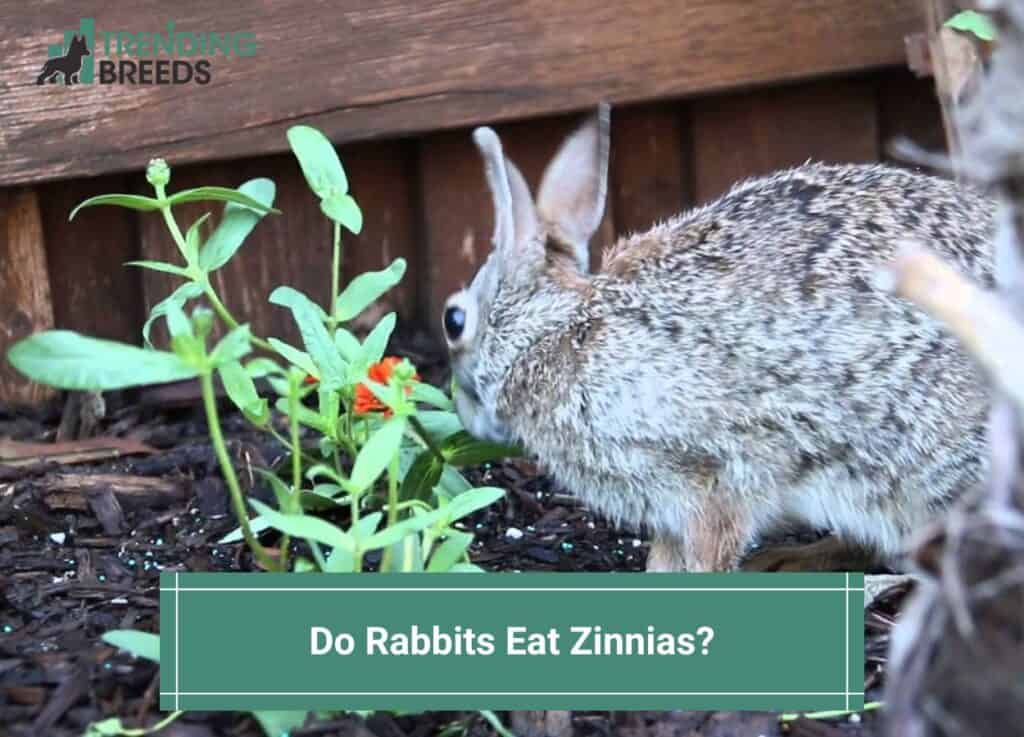
Zinnias add a splash of vibrant color to any garden, making them a popular choice for gardeners of all levels.
But what do you do when you come home to find your beloved zinnias chewed to the stem? Do rabbits eat zinnias, or was this a job for another critter?
The short answer is rabbits can eat zinnias, but they do not typically do so. While they may nibble or chew on the occasional leaf, they do not consume it in large quantities.
This is because rabbits are known to avoid eating zinnias, as they do not provide them with much nutrition.
If you’re wondering who else might be after your zinnias, read on for some of the most common culprits, as well as tips on keeping your rabbits safe!
Other articles you would like: Do Rabbits Have Claws? and What Does It Mean When A Bunny Licks You?
Table of Contents
What Is Eating My Zinnias?
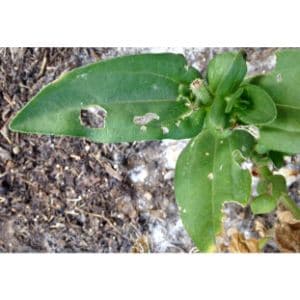
It can be difficult to determine exactly what is eating your zinnias if you do not catch the culprit in the act. However, there are a few common suspects to look out for that may be responsible for consuming your cherished flowers.
Let’s take a closer look at each one:
1. Deer
The first suspect is the deer, who can do considerable damage to any garden. Deer have a wide range of tastes and will happily munch on nearly any flower or vegetable they come across, including zinnias.
Although like rabbits, deer also tend to steer clear of zinnias in large part due to their low nutritional content, they do not turn down an easy meal.
If you are dealing with a particularly large deer population, it is likely that these animals are the ones consuming your zinnias.
To protect against deer, you’ll need to erect a fence around your garden at least 8 feet tall. You may also consider using repellent sprays formulated specifically for deer as an added layer of protection.
2. Woodchucks and Burrowing Animals
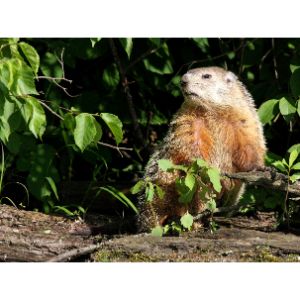
Other likely culprits are woodchucks and burrowing animals, such as groundhogs or moles. These critters often tunnel beneath gardens and can do significant damage in a short amount of time by chewing on tender roots or stems of plants like zinnias.
The bold color and unique shape of zinnias serve as the main attraction, as they do not actually provide any nutritional value to the animals. However, they do still find them irresistible.
To prevent these animals from causing harm to your garden, try using barriers that run along the perimeter of your garden, such as hardware cloth lined with chicken wire or plastic mesh fencing.
This should help deter any unwanted visitors from digging up your flowers.
3. Aphids
If there’s a pest that enjoys dining on your zinnias the most, it’s the humble aphid. Aphids are small insects that feed on the sap of plants like zinnias, which can cause major damage over time.
Fortunately, it’s relatively easy to get rid of aphids by introducing natural predators such as ladybugs or lacewings into your garden.
You can also use a mixture of dish soap and water to spray the leaves of your plants and help eliminate any existing aphid infestations.
4. Spider Mites
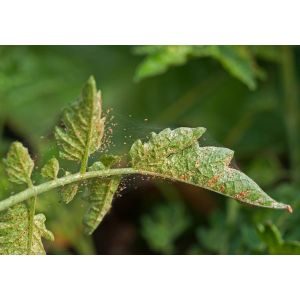
Spider mites are another tiny pest that may be to blame for your zinnias’ demise. Spider mites feed on the same sap as aphids and do not do much damage when they first arrive in small numbers.
However, if left unchecked, they can quickly become a major problem and do serious damage to your garden. To prevent this, it is important to regularly inspect your plants and remove any webs or eggs you may find.
You can also use a mixture of dish soap and water to help reduce the presence of spider mites in your garden.
5. Birds and Squirrels
Finally, birds and squirrels can also do their fair share of damage to zinnias by eating the petals and leaves of the plants. The bright colors of zinnias attract birds and squirrels to the garden, making them a favorite snack.
While it’s difficult to completely keep these creatures away from your garden, you can take certain steps to reduce their access.
Such as using bird netting or hanging wind chimes near zinnia plants which may help startle them away before they do too much damage.
Overall, it is important to remember that while rabbits do not typically eat zinnias, many other critters could still be responsible for damaging them. Taking proactive steps will help ensure they remain safe in your garden!
How Do You Keep Rabbits Out of Zinnias?
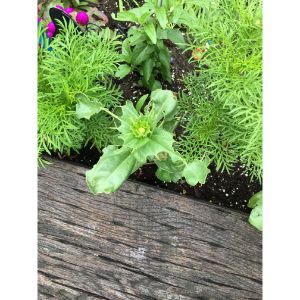
If your rabbits (or wild bunnies) have been recently snacking on your zinnias, there are a few steps you can take to discourage them from doing so in the future.
Here are some tips to help keep rabbits out of your zinnias:
1. Fencing
One of the most effective ways to keep rabbits away from your garden is by erecting a fence around it.
Mesh or wooden fences can do an excellent job of keeping rabbits and other animals out, especially if they are tall enough (at least two feet high).
If possible, try to make the fence at least 3 feet tall and ensure that there are no gaps or openings for the rabbits to enter.
Your fence doesn’t necessarily have to be permanent – you can also put removable fences in place when needed. This is especially useful if your rabbits are only seasonal visitors.
2. Repellents
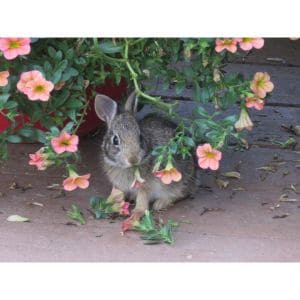
Repellents can also do a great job when it comes to keeping rabbits away from your garden.
You could use natural repellents such as garlic powder or cayenne pepper. However, commercial repellents specifically designed for rabbits do tend to be more effective.
If you decide to go the natural route, your best bet would be to mix garlic powder with some water and spray it onto the foliage of your plants. This should do a good job of keeping rabbits away from your garden.
Topical rabbit repellent or any spicy food item like mustard powder can also do the trick. In some cases, even sprinkling cayenne pepper flakes or used coffee grounds around your zinnias can do the job.
3. Deterrents
Another good way to keep rabbits away from your garden is using deterrents.
One of the most effective deterrents is a motion-activated sprinkler that sprays water when it detects movement. It will do an excellent job of scaring away rabbits and other animals.
While this will require you to install it, keep in mind that the sprinklers need to be recharged after a certain number of uses.
You could also use old CDs strung up around your garden to act as reflective deterrents or even sprinkle human hair around your plants. Both of these methods do a good job of keeping rabbits away without requiring any permanent installations.
4. Plant Plants That Rabbits Dislike
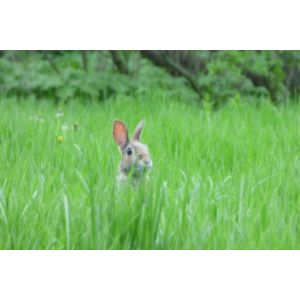
You can also try planting certain plants around your zinnias that rabbits do not typically like. This is a great way to keep them away from your zinnias without having to do too much work.
Some of the most effective plants for this purpose include marigolds, lavender, rosemary, and holly. Planting a few of these around your zinnia plants should do an excellent job of keeping rabbits away without any additional effort on your part.
5. Clean Up
Finally, it is also important to do your best to keep your garden clean and free from overgrown foliage.
This will do an excellent job of discouraging the rabbits from making a home in your garden and will also do a great job of keeping them away from your zinnias.
By removing any dead leaves and debris that might have accumulated in your garden, you can do a great job of reducing their food sources, making it difficult for them to stay around for too long.
Do Rabbits and Deer Eat Zinnias?
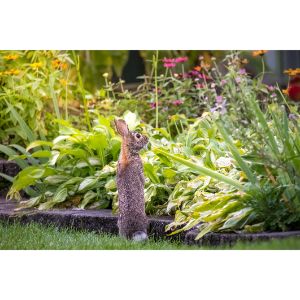
If you’re still wondering, “do rabbits eat zinnias?” or even if deers are the culprits behind the chewed foliage on your plants, the answer is not likely.
While rabbits sometimes nibble on the foliage and flowers of zinnias, they do not usually eat them as a major food source.
In fact, experts say that rabbits tend to dislike the small flowers of zinnias, so if you do find a chewed plant or flower in your garden, it’s probably not due to rabbits.
Deer do sometimes graze on zinnias when other food sources are scarce, but this is not typically the case.
Since deer do not prefer to eat zinnias, it’s probably safe to assume that any missing foliage or flowers from your garden are not due to them either.
Are Zinnias Safe for Rabbits?
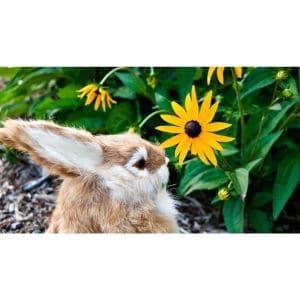
If your rabbits did happen to munch on a zinnia, rest assured that the flower itself is typically safe for them to eat. The foliage might be slightly toxic and cause stomach upset, but the flowers do not usually pose any danger at all.
Keep in mind that rabbits require a diet of hay and vegetables as their main source of nutrition, so it’s best to avoid too many flowers and other plants in their diet. A rabbit may throw up after eating too much Zinnias, but that’s likely the worst possible outcome.
If you want your rabbits to enjoy the occasional zinnia flower, make sure to monitor them closely and provide plenty of hay and vegetables as well.
Conclusion For “Do Rabbits Eat Zinnias”
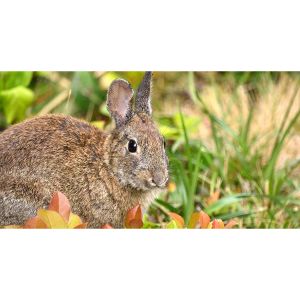
So, do rabbits eat zinnias? The answer is usually no, but if they are particularly hungry, rabbits may nibble on the plant.
It’s important to remember that rabbits are herbivores, and they need a healthy, varied diet of fresh vegetables and hay as their main food sources.
If you have pet bunnies and want to feed them zinnias, it is best to ask your veterinarian first, as they can advise you on the best diet for them.
You will also like:
- How Long Can Bunnies Go Without Food?
- Best Rabbit Rescues In The USA
- Why Did My Rabbit Die Stretched Out?
Before you feed your rabbit zinnias, you can learn what other foods you should feed your rabbit by watching “WHAT TO FEED YOUR PET RABBIT” down below:




